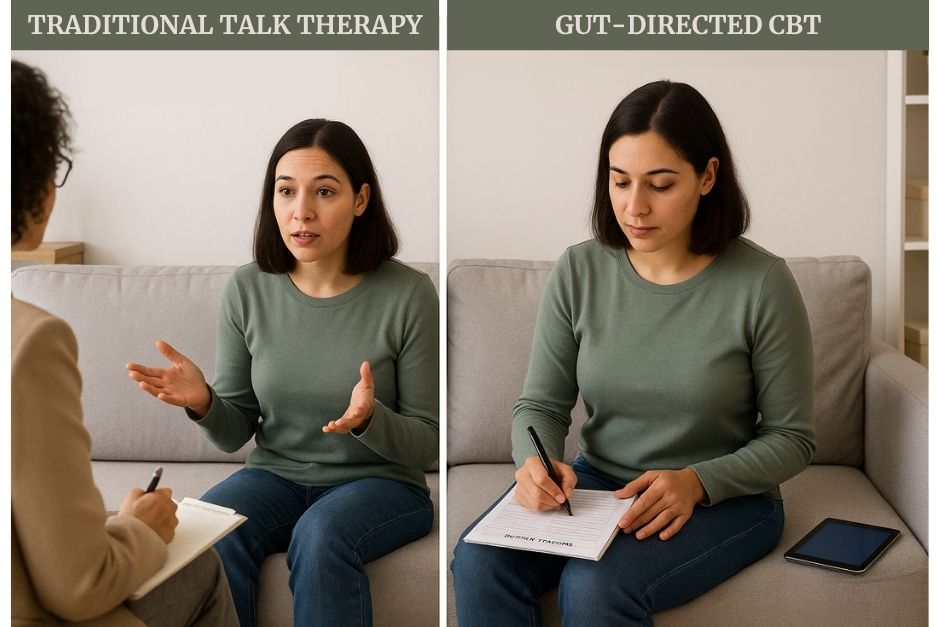What to expect from GI-specific Cognitive Behavioral Therapy and why it works
Written by Anna Katherine Black, PhD
Licensed Clinical Psychologist
GI Psychology
For those living with Irritable Bowel Syndrome (IBS), the emotional and physical toll of daily symptoms—bloating, cramping, urgency—can be overwhelming. You may have tried traditional talk therapy, but still felt stuck. That’s because IBS is not just a mental or physical condition—it’s a disorder of the gut-brain connection. And it requires a specialized approach.
Gut-focused CBT for IBS vs. traditional talk therapy reflects a shift in focus, tools, and evidence. Gut-focused CBT is a structured, skills-based approach that helps patients change their relationship to GI symptoms. It’s grounded in research and tailored to how the brain and digestive system interact.

What Makes Gut-Focused CBT Unique?
Traditional talk therapy is typically ongoing or long-term and often explores life events, emotions, or past traumas over open-ended conversations. While this support can be valuable, it doesn’t always address the symptom cycles that define IBS.
Gut-focused CBT (Cognitive Behavioral Therapy) is:
- Skills-based: You’ll learn practical techniques for calming your nervous system, reframing unhelpful thoughts, and shifting gut-related behaviors.
- Symptom-targeted: Sessions focus on reducing bloating, cramping, urgency, and food fears—not just general stress.
- Short-term: Typically 8–12 sessions, this therapy has a clear beginning, middle, and end.
Evidenced-based: Clinical trials show it improves IBS symptoms, quality of life, and emotional well-being (Lackner et al., 2011; Thakur et al., 2024).
What to Expect in GI-Specific CBT
At GI Psychology, gut-focused CBT sessions are structured and collaborative. Here’s what you can expect:
- Psychoeducation: You’ll learn how the gut-brain connection works and how it contributes to your symptoms.
- Cognitive restructuring: You’ll identify patterns like catastrophizing or health anxiety, and replace them with more balanced, helpful thoughts.
- Interoceptive exposure: A unique element of gut-focused CBT, this involves safely tuning into bodily sensations (like fullness or urgency) to reduce fear.
- Behavioral experiments: You’ll test new ways of eating, moving, and thinking to see what helps your symptoms.
- Symptom tracking: You’ll use worksheets or apps to monitor triggers, improvements, and setbacks.
Many patients feel more empowered after just a few sessions, not because the therapy is magical, but because it teaches them how to work with—not against—their nervous system.
Why It Works
Gut-focused CBT is based on the latest understanding of disorders of the gut-brain interaction. Clinical trials—including a 2024 network meta-analysis of over 5,000 patients—confirm that this therapy reduces pain, improves bowel habits, and enhances quality of life (Thakur et al., 2024).
It also addresses the cycle of fear and avoidance that often worsens symptoms. When people stop avoiding certain foods or situations and start practicing safe exposure, the brain relearns that the body is not in danger—and symptoms ease.
Takeaways
- Gut-focused CBT is a targeted, time-limited, evidence-based treatment for IBS.
- It helps rewire your brain’s response to gut sensations.
- It’s different from traditional talk therapy—and it works.
If you’re tired of managing IBS alone or unsure if therapy will make a difference, consider working with a gut-brain specialist.
Visit www.GIPsychology.com/resources to learn more, or contact us at admin@gipsychology.com to schedule a consultation.
References
Lackner, J. M., et al. (2011). A cognitive-behavioral treatment for irritable bowel syndrome using interoceptive exposure to visceral sensations. Journal of Consulting and Clinical Psychology, 79(5), 622–632.
Thakur, E. R., et al. (2024). Effect of Brain-Gut Behavioral Treatments on Abdominal Pain in Irritable Bowel Syndrome: A Systematic Review and Network Meta-Analysis. Gastroenterology, 167(5), 934–943.e5.
American Psychological Association. (2023). Understanding IBS and the brain-gut connection. Retrieved from https://www.apa.org/topics/pain
Rome Foundation. (2024). Brain-Gut Behavior Therapies. Retrieved from https://theromefoundation.org
National Institutes of Health. (2023). Chronic Pain and the Brain-Gut Axis. Retrieved from https://www.nih.gov
